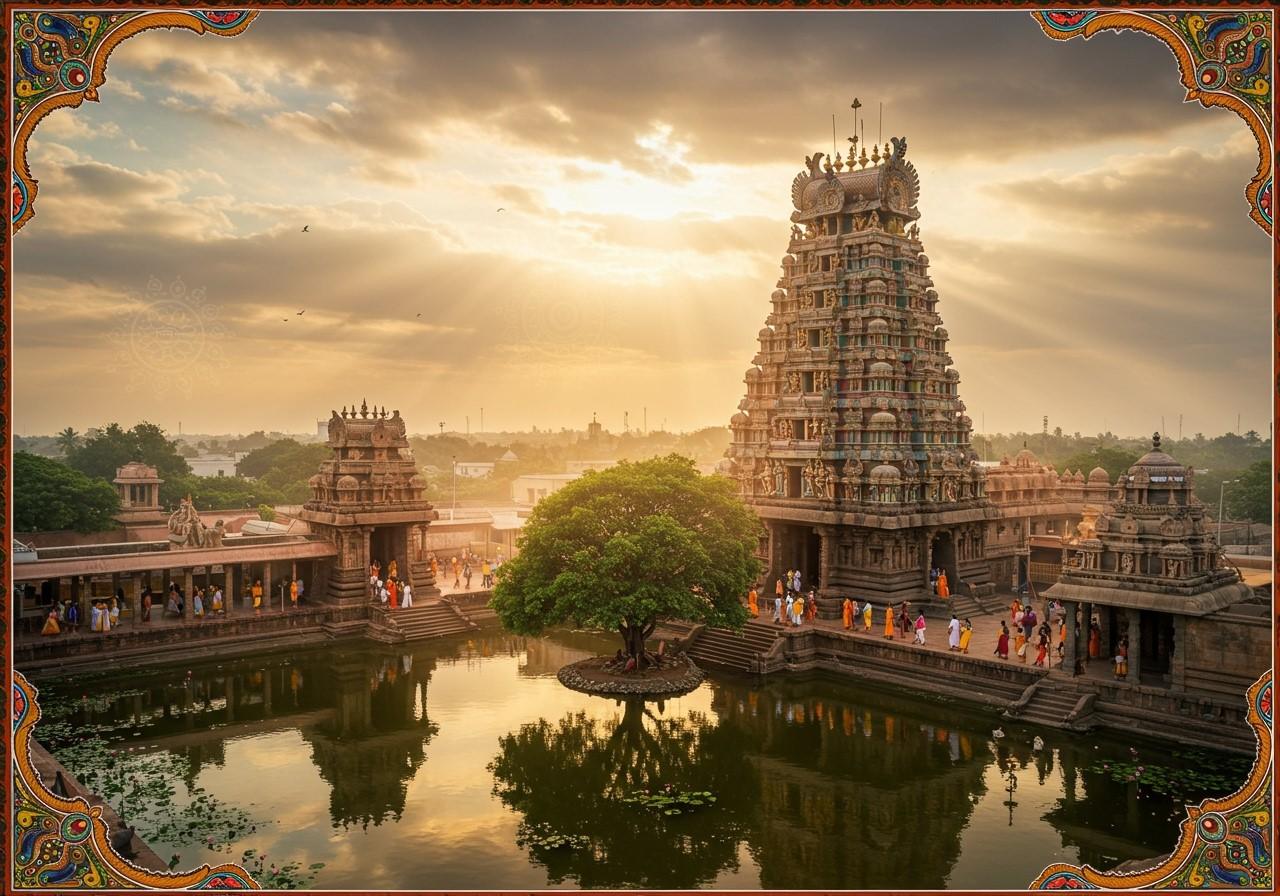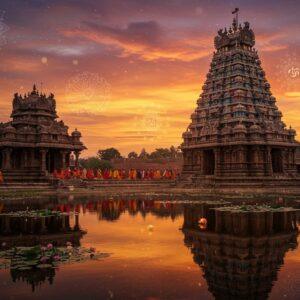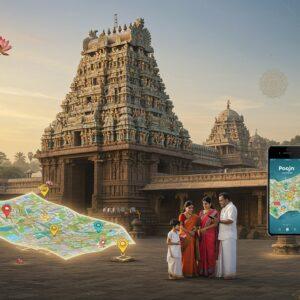
Kanchipuram, known as the “City of Thousand Temples,” is a historic city in Tamil Nadu, renowned for its spirituality, rich history, and remarkable architecture. It served as the capital of the Pallava Kingdom and is now the administrative headquarters of Kanchipuram district. The city features numerous temples, including the 108 Divya Desam temples, which are significant in Vaishnavism. Kanchipuram is also famous for its silk sarees and vibrant cultural heritage.
Historical Significance
Kanchipuram’s legacy as a spiritual center traces back to the Pallava dynasty. The Pallavas significantly shaped the city’s sacred landscape, constructing magnificent temples that continue to inspire awe. Later, the Cholas and the Vijayanagara Empire further enriched Kanchipuram’s architectural tapestry. The city also flourished as a hub of religious scholarship, particularly for the Shaiva and Vaishnava traditions.
Architectural Marvels
The temples of Kanchipuram exemplify the magnificence of Dravidian architecture. Their towering gopurams (gateway towers) and intricate carvings showcase exceptional artistry. The Kailasanathar Temple, an architectural gem, is celebrated for its elaborate sculptures and vibrant frescoes. The Ekambareswarar Temple stands out with its colossal gopuram and a sacred mango tree believed to be over 3,500 years old. The Varadharaja Perumal Temple captivates visitors with its ornate pillars and a breathtaking vimana (temple tower).
Prominent Temples of Kanchipuram
Kanchipuram is home to a constellation of revered temples:
- Kamakshi Amman Temple: Dedicated to Goddess Kamakshi, this temple is renowned for its grand festivals and is a significant Shakti Peetha.
- Devarajaswami Temple: A Vaishnava temple dedicated to Lord Vishnu, it is celebrated for its annual Garuda Seva during the Brahmotsavam festival.
- Kanchi Kudil: This heritage house offers a captivating glimpse into traditional Tamil Brahmin lifestyles and temple rituals.
Planning Your Visit
For a fulfilling visit to Kanchipuram, consider these practical details:
- Temple Timings: Most temples open early in the morning and close around noon, reopening in the late afternoon and closing in the evening. Check specific temple timings for accurate information.
- Best Time to Visit: The ideal time to visit Kanchipuram is during the cooler months (October to March) to avoid the intense summer heat. The city also comes alive during festivals.
- Local Transportation: Taxis, auto-rickshaws, and local buses provide convenient transportation within the city.
- Accommodation: A range of hotels and guesthouses cater to various budgets.
- Local Cuisine: Explore the city’s culinary scene and savor traditional South Indian delicacies at local restaurants.
Spiritual Practices and Rituals
The temples of Kanchipuram observe a rich tapestry of spiritual practices:
- Daily Pujas: Daily worship ceremonies are an integral part of temple life, offering a glimpse into the city’s vibrant religious traditions.
- Abhishekams: Ritual bathing of the deities is a significant practice in many temples, believed to invoke divine blessings.
- Festivals: Kanchipuram’s festivals, such as Panguni Uthiram and Vaikunta Ekadasi, are grand celebrations that attract devotees from far and wide.
Priests, often dressed in traditional attire, play a central role in these rituals. Visitors can also partake in prasadam, the sanctified food offered as a blessing.
Cultural and Religious Festivals
Kanchipuram’s festivals are a vibrant expression of its cultural and religious heritage:
- Brahmotsavam (Varadharaja Perumal Temple): This grand festival features elaborate processions and is a major highlight of the temple’s calendar.
- Mahashivaratri (Ekambareswarar Temple): Devotees observe night-long vigils and special pujas during this festival dedicated to Lord Shiva.
- Navaratri (Kamakshi Amman Temple): This nine-night festival celebrates the divine feminine and features intricate rituals and colorful decorations.
Poojn.in: Your Companion for a Sacred Journey
Poojn.in, India’s leading online store for spiritual and puja needs, empowers devotees to prepare for their pilgrimage to Kanchipuram. We offer a curated selection of authentic puja items and offerings, ensuring a spiritually enriching experience:
- Traditional Silk Vastrams and Dhoti Sets: Dress respectfully for temple visits with our exquisite collection of traditional attire.
- Pure Copper and Brass Pooja Items: Offer your prayers with authentic puja items crafted from pure copper and brass.
- Ready-to-Use Puja Thalis: Simplify your puja preparations with our convenient and complete puja thalis.
- Authentic Kumkum, Chandanam, and Vibhuti: Source pure and sacred ingredients for your rituals.
- Special Prasadam Boxes: Offer prasadam with reverence using our specially designed boxes.
- Temple-Grade Camphor and Agarbatti Sets: Enhance the sanctity of your puja with premium camphor and agarbatti.
- Pure Silver Coins for Temple Donations: Make your offerings with pure silver coins.
Visit poojn.in to explore our complete collection of temple essentials and have them delivered conveniently to your doorstep or hotel in Kanchipuram. (Please check individual temple guidelines regarding outside offerings.)
Conclusion
Kanchipuram, with its magnificent temples, rich history, and profound spirituality, offers a unique and enriching experience. A visit to this ancient city is a journey through time, connecting you with Tamil Nadu’s glorious past and its vibrant present. Whether you seek spiritual solace, architectural wonders, or cultural immersion, Kanchipuram welcomes you. Embrace the serenity, participate in the rituals, and let the divine energy of Kanchipuram’s temples nourish your soul. For more insights into specific temples and deities, explore our articles on Kalyana Venkateswara and Sri Prasanna Chennakesava Swamy Temple.


